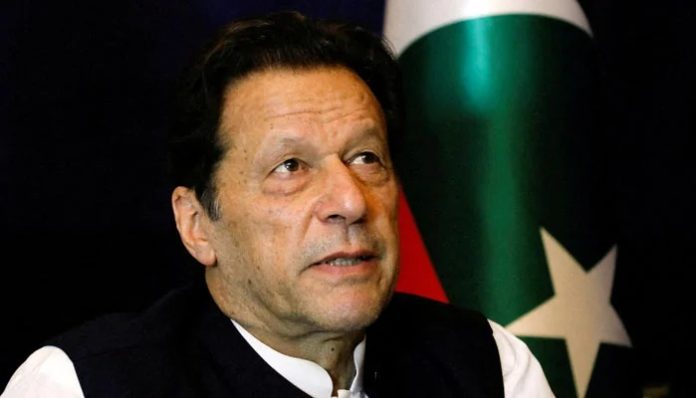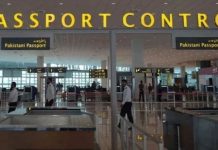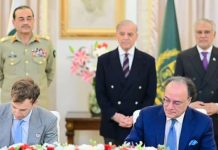DNA
KARACHI: The federal government has announced that it plans to ban Pakistan Tehreek-e-Insaf (PTI) in its bid to intensify measures against the former ruling party.
Information Minister Attaullah Tarar made the announcement during a press conference in Islamabad where he also revealed the government’s plans to file references against PTI founder Imran Khan and former president Arif Alvi for treason under Article 6.
The decision was based on a number of factors including the proven charge that Khan’s PTI had received foreign funds from sources that are illegal in Pakistan, as well as the party’s involvement in May 9 riots.
Analysts and experts have also given their take on the ban on PTI.
‘Not an unprecedented measure’
Reacting to the government’s decision to ban PTI, veteran journalist Hamid Mir said that it was “not an unprecedented measure.”
Mir said: “Several government ministers have previously signalled that PTI and Pakistan can’t work together and they have discussed a ban as well.
“This discussion began when Shehbaz Sharif became PM in 2022, and talks over this were intensified especially after May 9.”
He said that previously, the government believed that if a reference were to be filed against PTI, it would have been difficult with PTI leader Arif Alvi serving as president at the time and the reference would not be forwarded.
However, with Alvi no more serving as president, this decision to ban PTI seems to have been taken yesterday during a meeting led by former PM Nawaz Sharif.
‘Desperate move’
Anchorperson Shahzeb Khanzada said the government’s announcing to ban the PTI, just two days after the Supreme Court ruling that declared the former ruling party a parliamentary party, was a desperate move.
He said 11 out of 13 judges of the apex court, including the chief justice, had recognised the PTI as a parliamentary party.
“Are you responding to the PTI (through this move) or the SC. If you are responding to the SC then you are responding to the current chief justice, the next CJ and the CJ after that as well,” he said.
The journalist said the government would itself have to approach the top court for implementation of the government decision, as it has already announced.
However, he said, the government would not be able to receive its desired relief from the SC.
He said the government was taking such measures under pressure of state institutions and “these are such moves that they themselves will not be able to face in the future”.
‘Govt’s decision will deepen political crisis’
Speaking to the media persons, veteran journalist and political analyst Mazhar Abbas said that the ban was not likely to bring about political stability.
“Ban on a political party and that too country’s largest party both inside and outside the Parliament will not go well in bringing political stability,” Abbas said. “On the contrary it will further deepen the political crisis.”
He added: “Secondly, Article 6 is very specific and cannot be applied on former president or ex-speaker of National Assembly.”
Abbas further emphasised that Pakistan Muslim League-Nawaz (PML-N) has “looked nervous” since the last Supreme Court 8-5 decision in favour of PTI on reserved seats.
‘Pretty much straightforward’
Political analyst Muneeb Farooq said that the procedure of banning a political party is “pretty much straightforward”.
“It was laid down in the political parties order 2002 and was replicated in Election Act 2017 and the procedure is laid down in Section 212,” said Farooq.
“Section 2.2 mentions that if a particular party acts in a manner whichis prejudicial to the sovereignty and integrity of the state of the country, or if it’s a foreign funded party or if the political particular political party is involved in terrorism, the government of the day can issue a declaration,” he explained.
The analyst said that it is initiated by the the Ministry of Interior, the declaration is then published in the gazette and the government, after it is done with the formalities, sends the reference to the SC.
“Now the SC will decide whether to uphold or endorse the particular reference or the declaration. If it upholds it, it sends it back to the government which then issues the particular dissolution order of the said political party,” said Farooq.
He said that the Section 212 only mentions the name of the SC but not the number of judges who are going to hear the particular reference, adding that the chances of success of such declaration are “bleak” if the chief justice of Pakistan decides to take it up as full court hearing.
“We have recently witnessed that the SC judges are inclined to the PTI and they not only restored the number of seats given to other political party, they also went beyond their mandate and gave PTI what it didn’t ask for. PTI was never a petitioner in that particular case but they basically restored their status,” highlighted the analyst.
“Taking that precedent in mind and putting things in context, I have a feeling that if the CJP chooses to make it a formal hearing of all 13 judges, then the likelihood of the success of this declaration is pretty weak,” Farooq said.
He added that if the CJP picks up three of five judges of his own choice and hears and endorses this declaration, then the party will be gone.
“With regards to initiating the proceedings of Article 6, the procedure will start from the government — firstly from the cabinet then the interior ministry, and the particular case will be sent to SC which will then decide. A lot depends on how the government plays with it and how the SC takes it,” he concluded.

















